Serving 761 students in grades 9-12, Pembroke Academy ranks in the bottom 50% of all schools in New Hampshire for overall test scores (math proficiency is bottom 50%, and reading proficiency is bottom 50%).
The percentage of students achieving proficiency in math is 20-24% (which is lower than the New Hampshire state average of 40%). The percentage of students achieving proficiency in reading/language arts is 45-49% (which is lower than the New Hampshire state average of 51%).
The student:teacher ratio of 12:1 is higher than the New Hampshire state level of 11:1.
Minority enrollment is 12% of the student body (majority Hispanic and Black), which is lower than the New Hampshire state average of 18% (majority Hispanic).
Quick Stats (2025)
- Grades: 9-12
- Enrollment: 761 students
- Student:Teacher Ratio: 12:1
- Minority Enrollment: 12%
- Graduation Rate: 90-94% (Top 20% in NH)
- Overall Testing Rank: Bottom 50%
- Math Proficiency: 20-24% (Btm 50%)
- Reading Proficiency: 45-49% (Btm 50%)
- Science Proficiency: 25-29% (Btm 50%)
- Source: National Center for Education Statistics (NCES), NH Dept. of Education
Top Rankings
Pembroke Academy ranks among the top 20% of public schools in New Hampshire for:
Category
Attribute
Graduation Rate
School Overview
Pembroke Academy's student population of 761 students has stayed relatively flat over five school years.
The teacher population of 61 teachers has grown by 7% over five school years.
Grades Offered
Grades 9-12
Total Students
761 students
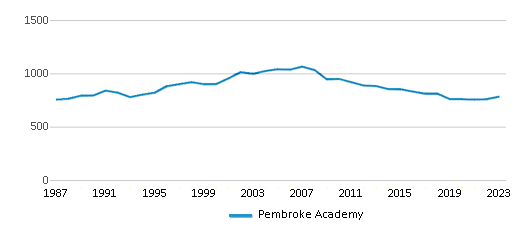
Gender %
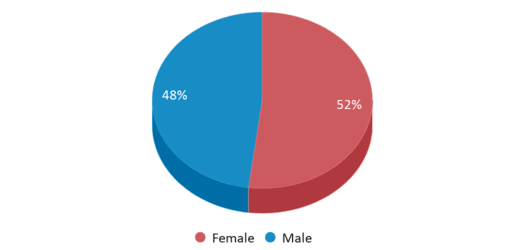
Total Classroom Teachers
61 teachers
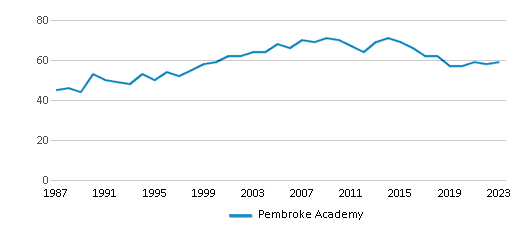
Students by Grade
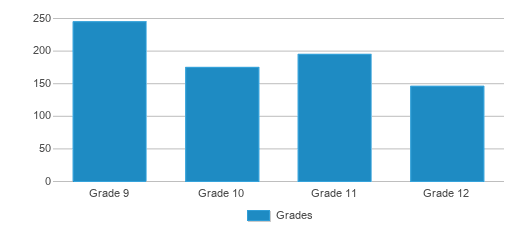
School Rankings
Pembroke Academy ranks within the bottom 50% of all 457 schools in New Hampshire (based off of combined math and reading proficiency testing data).
The diversity score of Pembroke Academy is 0.22, which is less than the diversity score at state average of 0.32. The school's diversity has stayed relatively flat over five school years.
Overall Testing Rank
#344 out of 457 schools
(Bottom 50%)
(Bottom 50%)
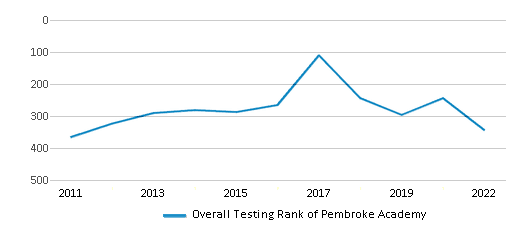
Math Test Scores (% Proficient)
20-24%
40%
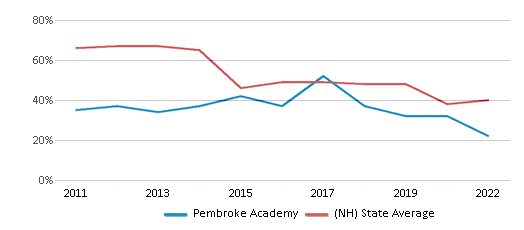
Reading/Language Arts Test Scores (% Proficient)
45-49%
51%
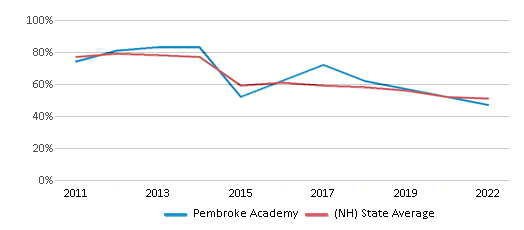
Science Test Scores (% Proficient)
25-29%
36%
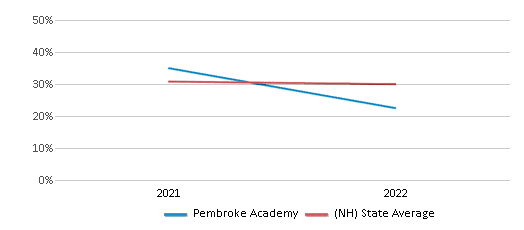
Student : Teacher Ratio
12:1
11:1
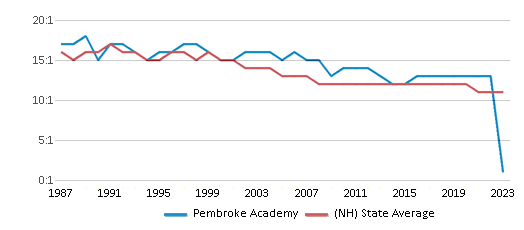
American Indian
n/a
n/a
Asian
1%
3%
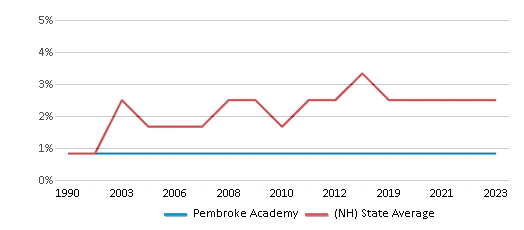
Hispanic
3%
8%
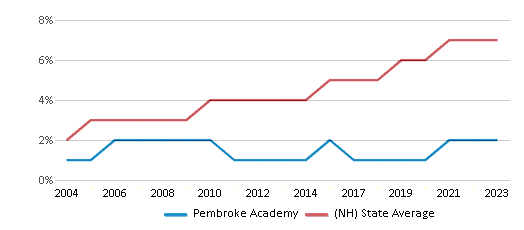
Black
2%
2%
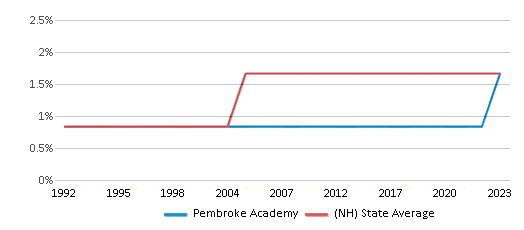
White
88%
82%
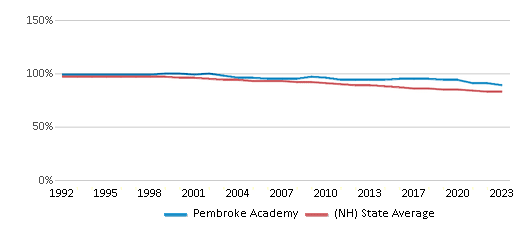
Hawaiian
n/a
n/a
Two or more races
6%
5%
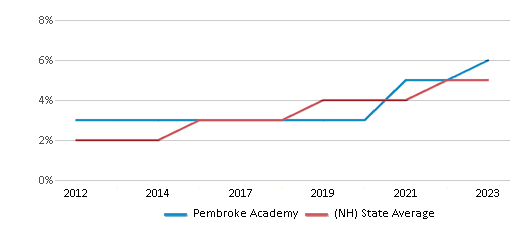
All Ethnic Groups
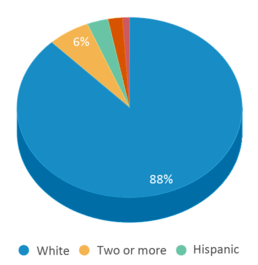
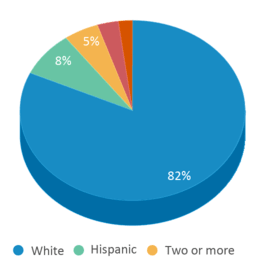
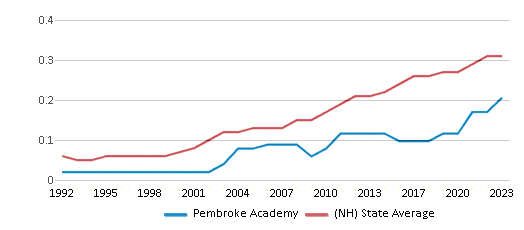
Graduation Rate
90-94%
88%
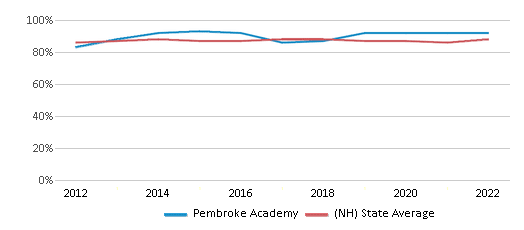
Participates in the National School Lunch Program (NSLP)
Yes
Eligible for Free Lunch
19%
20%
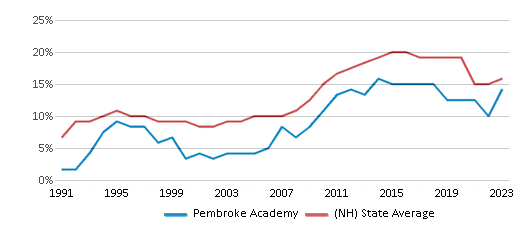
Eligible for Reduced Lunch
4%
4%
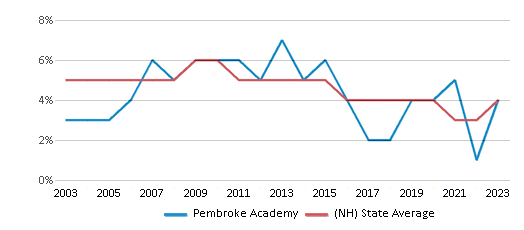
School District Name
Source: National Center for Education Statistics (NCES), NH Dept. of Education
Profile last updated: 02/09/2025
Frequently Asked Questions
What is Pembroke Academy's ranking?
Pembroke Academy is ranked #344 out of 457 schools, which ranks it among the bottom 50% of public schools in New Hampshire.
What schools are Pembroke Academy often compared to?
Pembroke Academyis often viewed alongside schools like John Stark Regional High School by visitors of our site.
What percent of students have achieved state testing proficiency in math and reading?
20-24% of students have achieved math proficiency (compared to the 40% NH state average), while 45-49% of students have achieved reading proficiency (compared to the 51% NH state average).
What is the graduation rate of Pembroke Academy?
The graduation rate of Pembroke Academy is 90-94%, which is higher than the New Hampshire state average of 88%.
How many students attend Pembroke Academy?
761 students attend Pembroke Academy.
What is the racial composition of the student body?
88% of Pembroke Academy students are White, 6% of students are Two or more races, 3% of students are Hispanic, 2% of students are Black, and 1% of students are Asian.
What is the student:teacher ratio of Pembroke Academy?
Pembroke Academy has a student ration of 12:1, which is higher than the New Hampshire state average of 11:1.
What grades does Pembroke Academy offer ?
Pembroke Academy offers enrollment in grades 9-12
What school district is Pembroke Academy part of?
Pembroke Academy is part of Pembroke School District.
School Reviews
5 2/27/2023
My children have loved Pembroke Academy. The teachers are supportive and interactive, the curriculum is challenging and college preparatory. They haven''t experienced any bullying and feel safe.
2 11/26/2007
In no way would I recommend this school for anyone. The curriculium is not great to begin with, and it doesn't help that many of the teachers(with a few exeptions) are not very good at teaching! The very few extracurricular activities are jokes for the most part(the "anime club" is nothing more than playing video games), and the sports teams are rarely any good. The administration is laughable, never interacting with students and treating the school more like a prison than a place of learning. I have also seen the principles not honor their word and discourage students from their dreams. There is little paretal involvement for the most part unless something drastic happens with a student. EVERY person that I have talked to that came from another district(students, teachers, parents) have said they preferred their old district to this one. The only good thing I can think to say is that the facilities are not bad. Don't be fooled by the acadimic award they won, they in no way deserved it(I have heard, but haven't seen substanial evidence, that they "got rid of" records of bullying, fighting, etc. in order to recieve the award). If at all possible DO NOT send your children to this school.
5 3/9/2007
I recommend this school, because there is alot of music, art and corus classes to select from. The english classes such as journalism are fun and offer much to learn, as well as algebra and geometry. The computer and woodworking work shops are tremendous and the acedemic success changes through your stay at Pembroke Academy.
Review Pembroke Academy. Reviews should be a few sentences in length. Please include any comments on:
- Quality of academic programs, teachers, and facilities
- Availability of music, art, sports and other extracurricular activities
Recent Articles

What Is A Charter School?
Explore the world of charter schools in this comprehensive guide. Learn about their history, how they operate, and the pros and cons of this educational innovation. Discover key facts about charter schools, including admission policies, demographics, and funding, as well as what to look for when considering a charter school for your child.

10 Reasons Why High School Sports Benefit Students
Discover the 10 compelling reasons why high school sports are beneficial for students. This comprehensive article explores how athletics enhance academic performance, foster personal growth, and develop crucial life skills. From improved fitness and time management to leadership development and community representation, learn why participating in high school sports can be a game-changer for students' overall success and well-being.

February 05, 2025
Understanding the U.S. Department of Education: Structure, Impact, and EvolutionWe explore how the Department of Education shapes American education, from its cabinet-level leadership to its impact on millions of students, written for general audiences seeking clarity on this vital institution.









